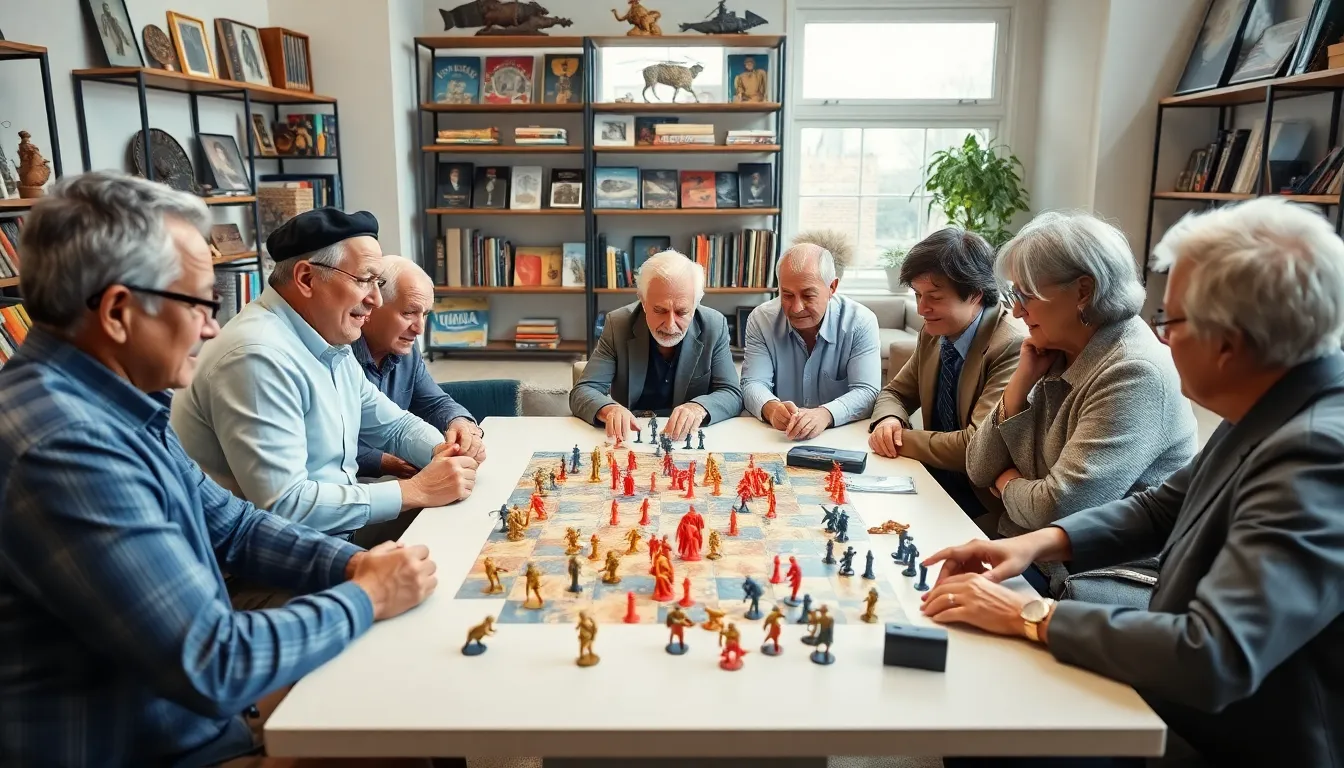Imagine gathering around a table, dice clattering like the sound of battle drums, with a group of lively seniors strategizing their next move in a world far removed from their living rooms. War games for elders might not sound like your typical Saturday night activity, but these delightful escapades are anything but dull. Not only do they capture attention, but they also offer insights into history, strategy, and camaraderie. So, why not jump into the engaging realm of war gaming and discover what makes it a perfect fit for those golden years? Let’s break it down, shall we?
Table of Contents
ToggleUnderstanding War Games: A Brief Overview

War games, in a nutshell, are strategic games that simulate armed conflict. They allow players to assume roles of generals, strategists, and sometimes even soldiers, each making decisions that can lead to victory or defeat. The genre spans board games, video games, and tabletop RPGs, offering something for every type of strategist. With roots tracing back to ancient military exercises, the mechanics of these games have evolved significantly, integrating elements of resource management, tactical planning, and, of course, a dose of luck. From historical battles to fictional realms, there’s a war game ready to ignite the imagination of players, young and old alike.
Why Elders Should Engage in War Games
Engagement in war games offers numerous advantages for older adults. Firstly, these games provide a fun outlet for mental stimulation, crucial for maintaining cognitive functions. They encourage critical thinking and strategic planning, pushing players to make calculated moves while anticipating opponents’ actions. Also, playing these games can transport individuals to various historical settings, enriching their knowledge and providing context to events they may have lived through or studied. Also, it’s an opportunity for reminiscence: many seniors enjoy sharing stories from their past, particularly if the games remind them of historical events they experienced during their lifetime.
Types of War Games Suitable for Elders
When it comes to war games for seniors, diversity reigns supreme. Here are some popular options:
Board Games
- Memoir ’44: This game combines easy mechanics with historical scenarios from World War II, allowing players to recreate iconic battles. The rules are straightforward, making it accessible and enjoyable for all skill levels.
- Risk: A classic in the genre, Risk challenges players to strategize and conquer territories. Its territorial disputes and alliances foster an engaging atmosphere.
Digital Games
- Civilization VI: This turn-based strategy game allows players to lead a civilization from the ancient era to modern times. It’s rich in history and deeply strategic, perfect for those who enjoy immersing themselves in detailed gameplay.
- Total War: Three Kingdoms: A blend of turn-based strategy and real-time tactics, this game takes place in ancient China and challenges players to choose their factions wisely.
Tabletop RPGs
- Dungeons & Dragons: While fantasy-focused, many of the mechanics encourage tactical thinking and collaborative storytelling, making it appealing for those who enjoy a blend of strategy and social engagement.
Benefits of War Games for Cognitive Health
The benefits of engaging in war games extend beyond mere entertainment. Numerous studies have suggested that strategic gaming can significantly boost cognitive health in seniors.
- Enhancement of Problem-Solving Skills: Regular participation in war games requires individuals to plan several steps ahead, evaluating potential outcomes. This exercise sharpens decision-making skills, which are key components in cognitive development.
- Memory Improvement: Many war games require players to remember rules, strategies, and various game components. This continuous mental effort encourages the brain to form new neural connections, eventually improving overall memory retention.
- Increased Mental Agility: Dealing with complex scenarios enhances adaptability and quick thinking, combating feelings of cognitive decline often associated with aging. With each game session, seniors may find themselves feeling more alert and engaged.
Social Aspects of Playing War Games
War games also create a vibrant social platform for elders. Gatherings around the gaming table allow friends and family to connect, share stories, and bond over friendly competition. During gameplay, laughter and discussions flow as strategies unfold.
- Community Building: Many local game shops or community centers offer war game nights, which can help seniors make new friends and forge connections with like-minded individuals.
- Family Engagement: Inviting younger family members to join in can bridge generational gaps, fostering conversations that lead to deeper understanding and connection. The collaborative effort creates an atmosphere of joy and achievement.
How to Get Started with War Gaming
Ready to jump into the world of war games? Here’s a handy guide for any elder looking to embark on this journey:
- Find the Right Game: Start with a game that resonates with personal interests or historical events. Easy-to-learn games such as Memoir ’44 or Ticket to Ride can serve as great starters.
- Join Local Gaming Groups: Many communities have groups dedicated to board gaming or tabletop RPGs. Participating in these can help with learning the ropes and meeting new friends.
- Attend Game Nights: Look for get-togethers at local libraries or community centers. These events often encourage beginners, providing a low-pressure environment to get comfortable.
- Online Tutorials and Videos: If physical gatherings aren’t possible, numerous resources are available online, offering tutorials, walkthroughs, and even gameplays to observe.